新目标英语八年级下Unit 5 Section B(1a-1d)-Self Check课件
文档属性
| 名称 | 新目标英语八年级下Unit 5 Section B(1a-1d)-Self Check课件 | 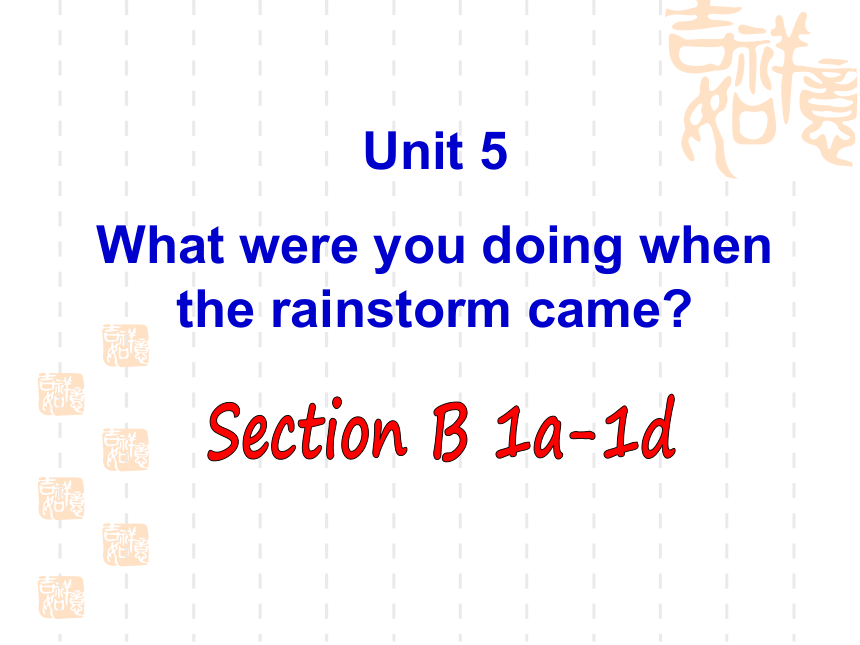 | |
| 格式 | zip | ||
| 文件大小 | 7.0MB | ||
| 资源类型 | 教案 | ||
| 版本资源 | 人教新目标(Go for it)版 | ||
| 科目 | 英语 | ||
| 更新时间 | 2016-04-08 10:05:58 | ||
图片预览

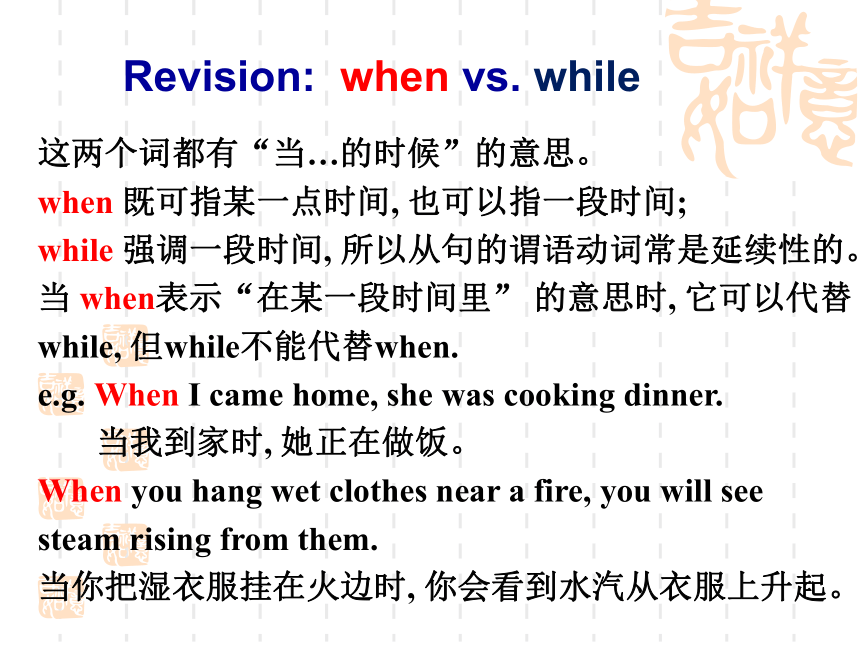
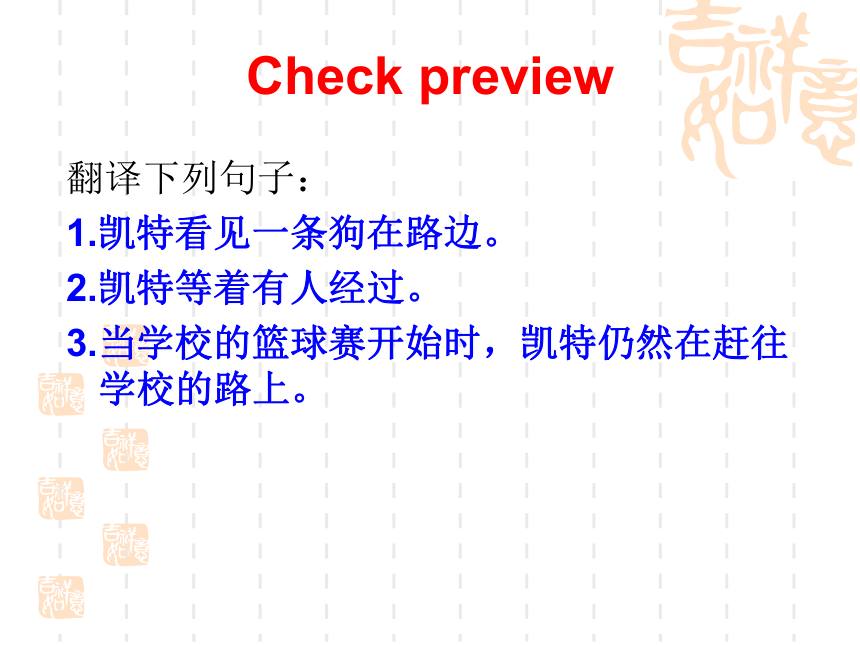
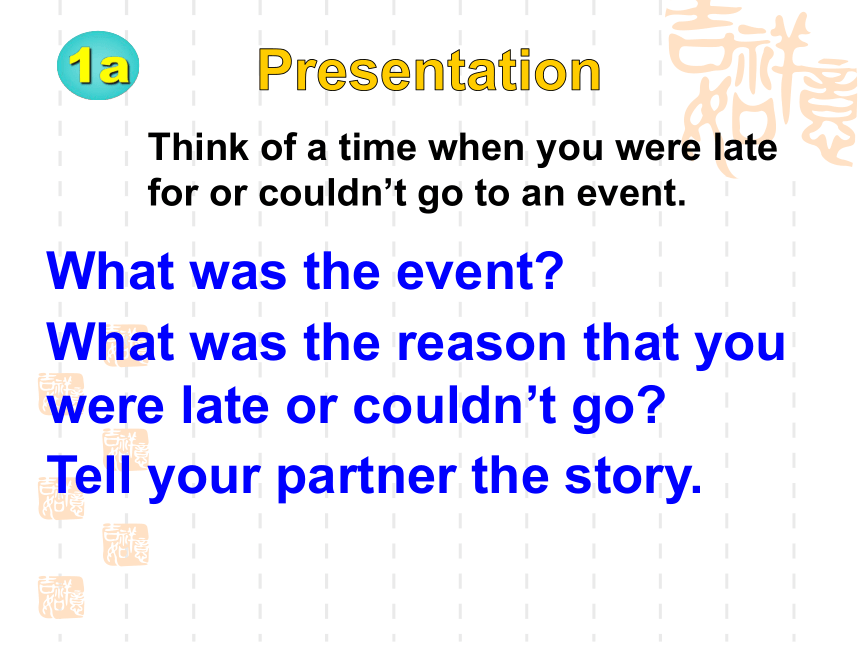
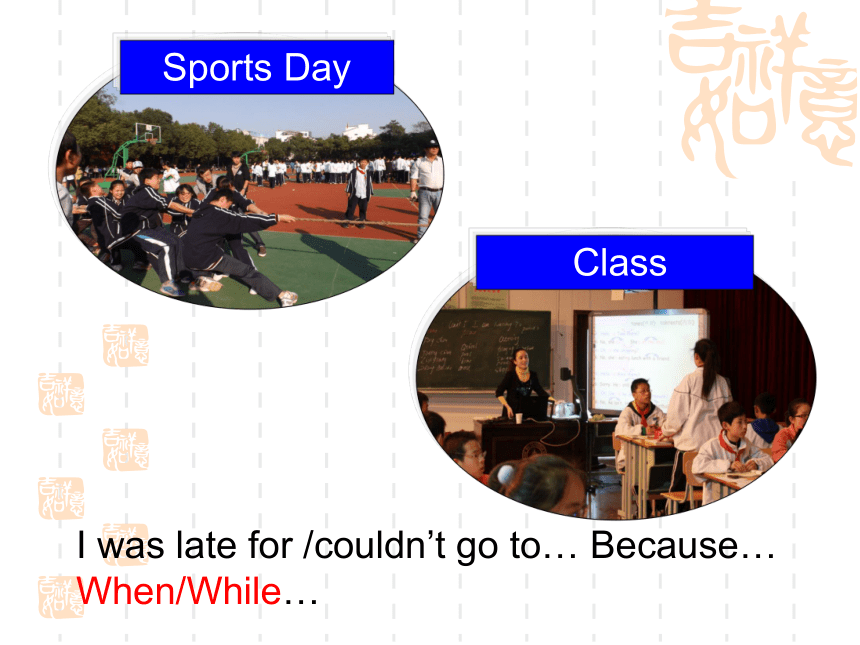
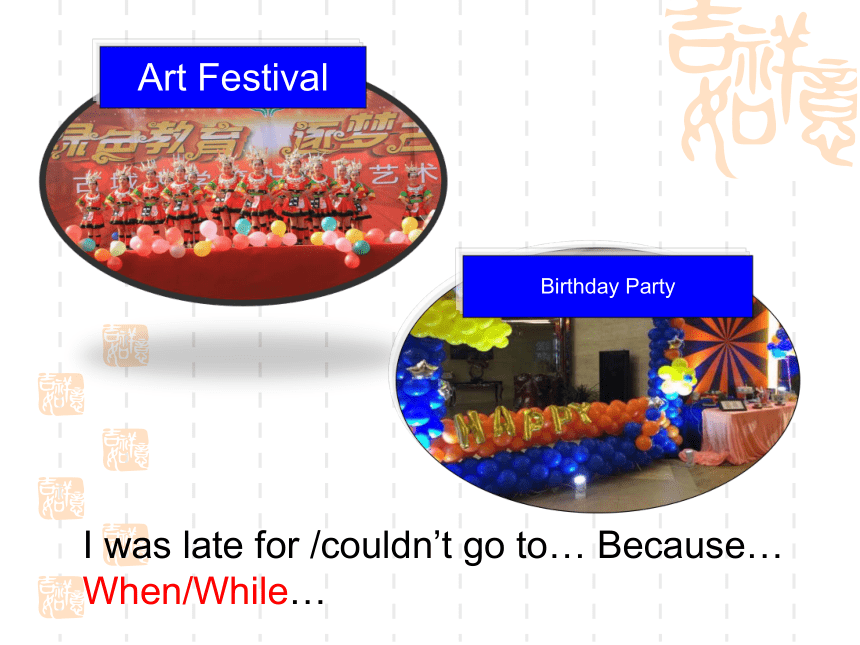
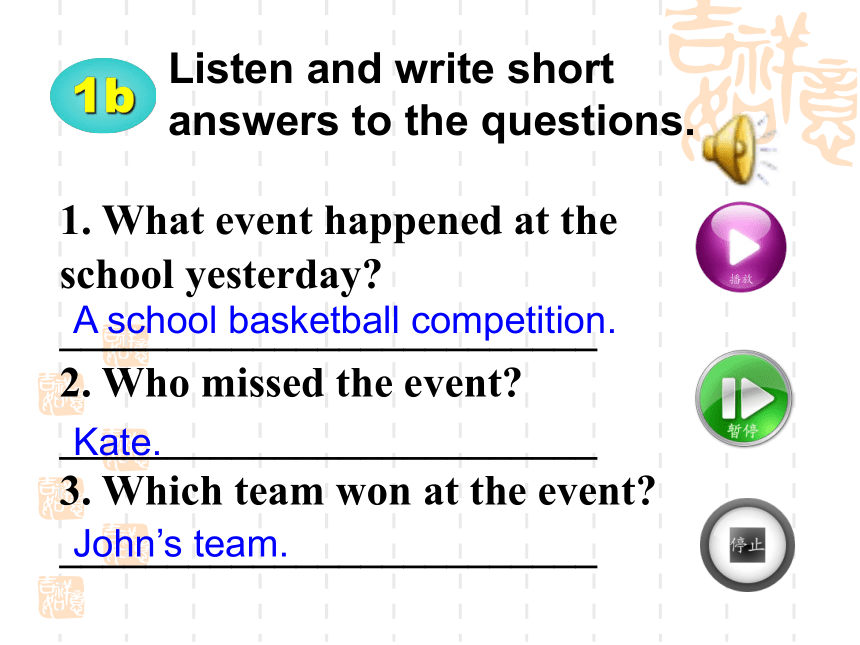
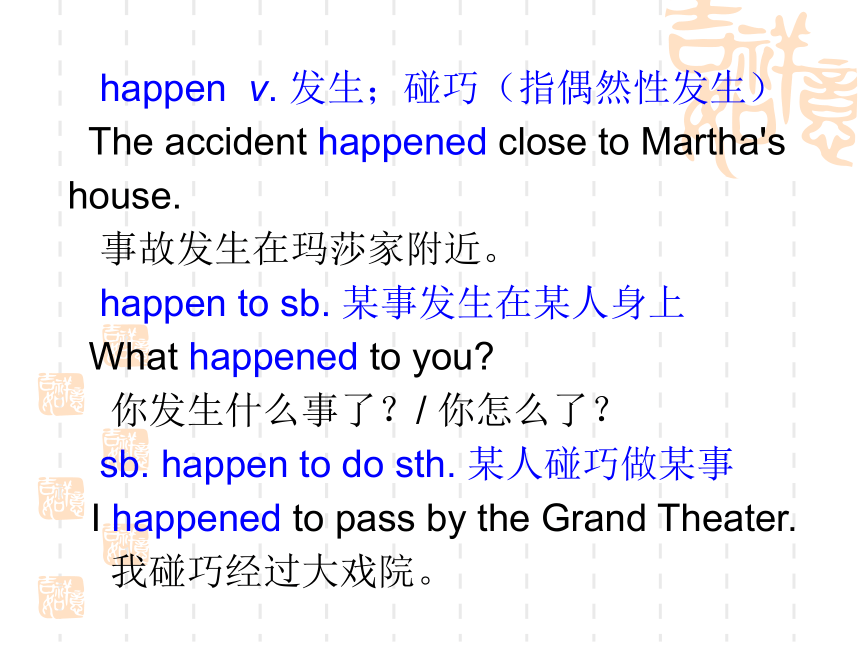
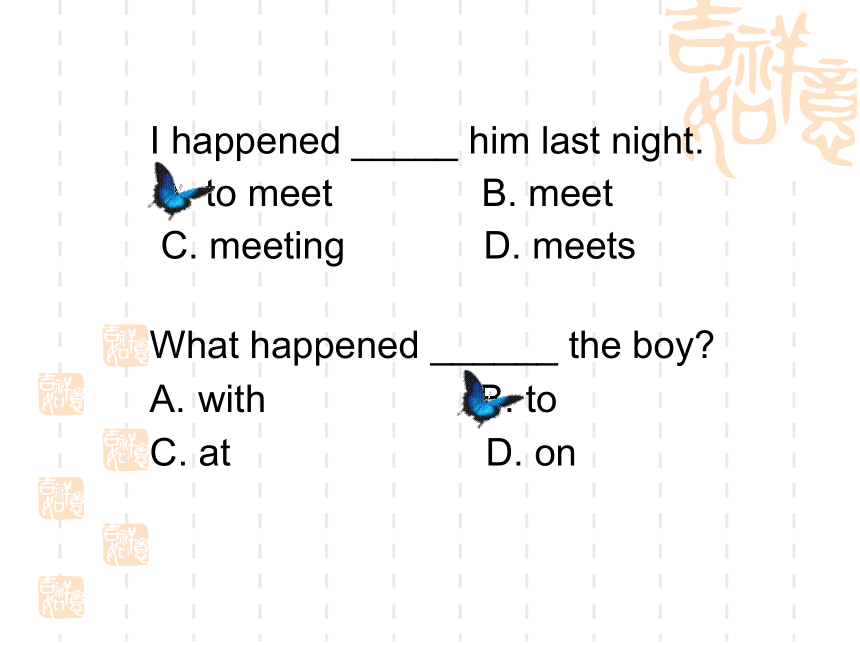
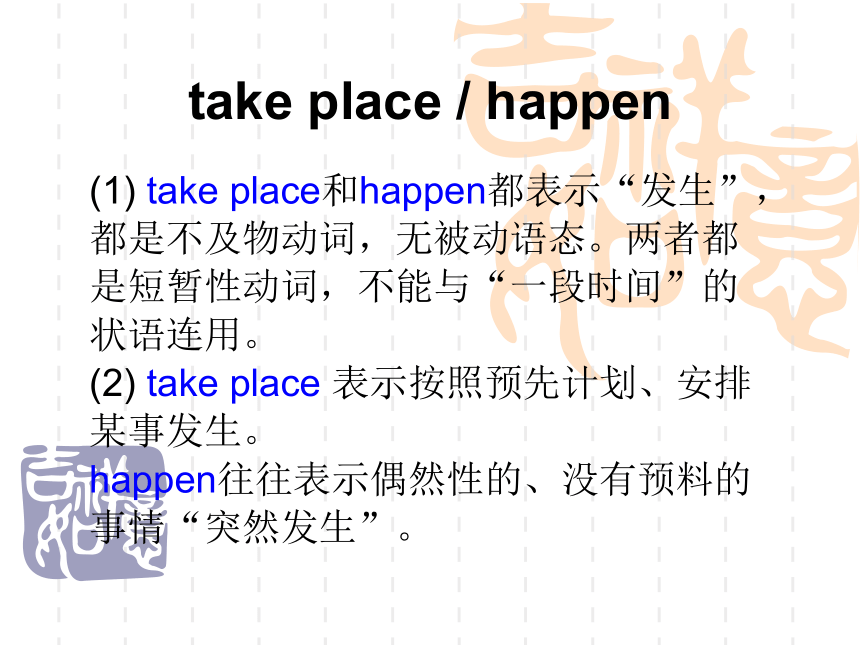
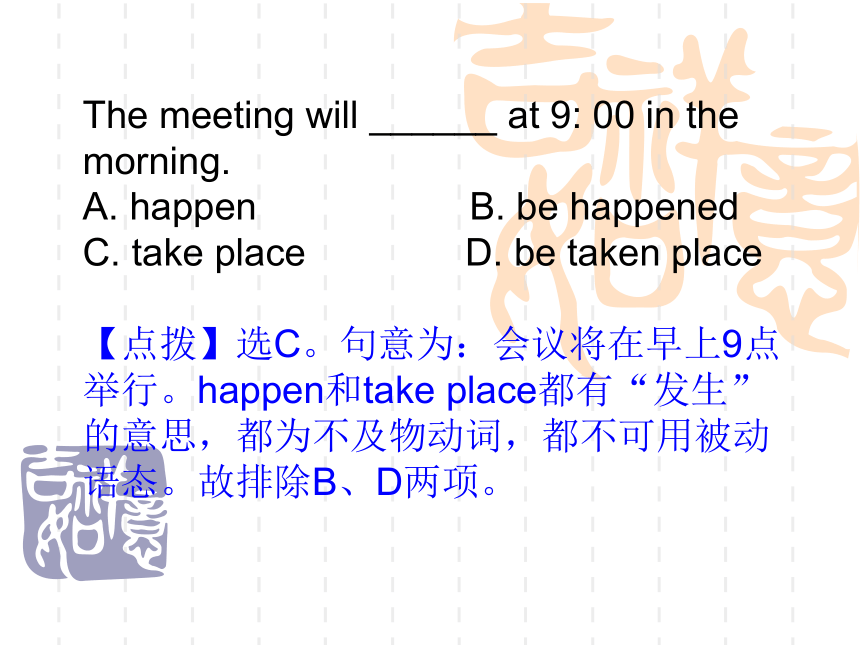
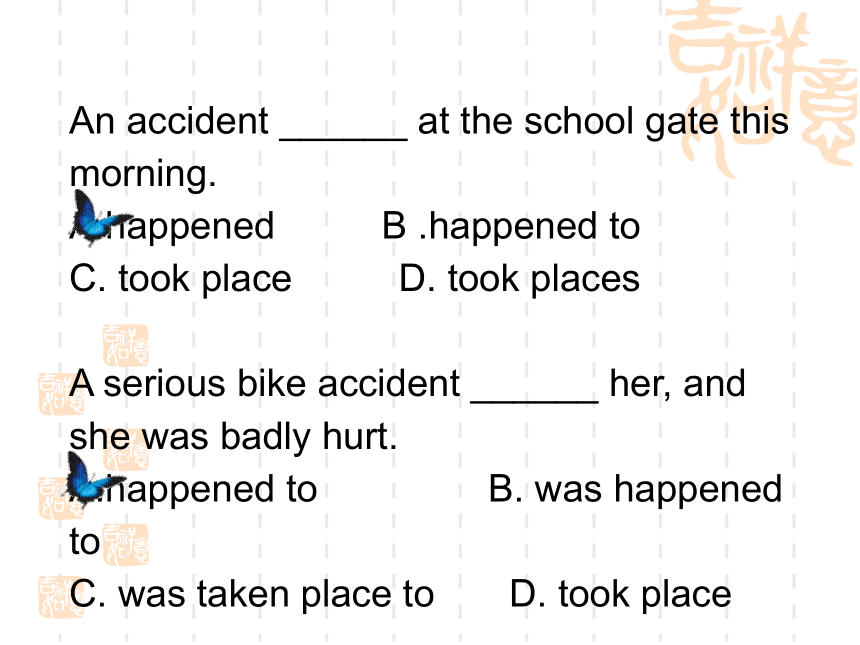
文档简介
课件120张PPT。Unit 5
What were you doing when the rainstorm came?Section B 1a-1dRevision: when vs. while 这两个词都有“当…的时候”的意思。
when 既可指某一点时间, 也可以指一段时间;
while 强调一段时间, 所以从句的谓语动词常是延续性的。
当 when表示“在某一段时间里” 的意思时, 它可以代替
while, 但while不能代替when.
e.g. When I came home, she was cooking dinner.
当我到家时, 她正在做饭。
When you hang wet clothes near a fire, you will see
steam rising from them.
当你把湿衣服挂在火边时, 你会看到水汽从衣服上升起。Check preview翻译下列句子:
1.凯特看见一条狗在路边。
2.凯特等着有人经过。
3.当学校的篮球赛开始时,凯特仍然在赶往学校的路上。1aThink of a time when you were late for or couldn’t go to an event. What was the event?
What was the reason that you were late or couldn’t go?
Tell your partner the story.PresentationSports Day ClassI was late for /couldn’t go to… Because…
When/While…Art FestivalBirthday PartyI was late for /couldn’t go to… Because…
When/While…Listen and write short answers to the questions.1b1. What event happened at the school yesterday?
_________________________
2. Who missed the event?
_________________________
3. Which team won at the event?
_________________________A school basketball competition.Kate.John’s team. happen v. 发生;碰巧(指偶然性发生)
The accident?happened close to Martha's house.
事故发生在玛莎家附近。
happen to sb. 某事发生在某人身上
What happened to you?
你发生什么事了?/ 你怎么了?
sb. happen to do sth. 某人碰巧做某事
I happened to pass by the Grand Theater.
我碰巧经过大戏院。I happened _____ him last night.
A. to meet B. meet
C. meeting D. meets
What happened ______ the boy?
with B. to
C. at D. on(1) take place和happen都表示“发生”,都是不及物动词,无被动语态。两者都是短暂性动词,不能与“一段时间”的状语连用。
(2) take place 表示按照预先计划、安排某事发生。
happen往往表示偶然性的、没有预料的事情“突然发生”。take place / happenThe meeting will ______ at 9: 00 in the morning.
A. happen B. be happened
C. take place D. be taken place
【点拨】选C。句意为:会议将在早上9点举行。happen和take place都有“发生”的意思,都为不及物动词,都不可用被动语态。故排除B、D两项。An accident ______ at the school gate this morning.
happened B .happened to
C. took place D. took places
A serious bike accident ______ her, and she was badly hurt.
happened to B. was happened to
C. was taken place to D. took placePresentation1a Think of a time when you were late for or couldn’t go to an event. What was the event? What was the reason why you were late or couldn’t go? Tell your partner the story.1b Listen and write short answers to the questions.1. What event happened at the school yesterday?
2. Who missed the event?
3. Which team won at the event?ListeningWhat happened to the girl? Let’s listen.The school basketball competition.
Kate.
John’s team.1c Listen again. Number the events [1-6] in the order they happened.____ Kate saw a dog by the side of the road.
____ Kate got to the bus stop.
____ Kate called the Animal Helpline.
____ Kate left the house.
____ Kate waited for someone to walk by.
____ Kate realized her bag was still at home.123456 realize v. 理解;领会;认识到
I didn't realize how late it was.
我没有意识到天已经这么晚了。
He didn't realize his mistake.
他没有认识到他的错误。
realize from 从……获得
He realized from her remarks that she was homesick.
从她的话中他领会到她想家了。 realize还有“使梦想、计划、希望等成为现实”的意思。
He was sure all their plans would be realized.
他相信他们的计划都会实现。1d Talk about why Kate missed the school
basketball competition. Student A begins a sentence with while or when. Student B completes the sentence.A: When the school basketball competition started …
B: When the school basketball competition started, Kate was still making her way to school.SpeakingA: When she got to the bus stop, Kate …
B: When she got to the bus stop,
Kate realized that her bag was still at home.
A: While she was running back home, …
B: While she was running back home, she saw a dog by the side of the road.make one’s way to 在某人去……的路上 (当后接地点副词时, 应省略介词to)
I soon made my way to the bookshop.
我很快向那个书店出发。
I’ll make my way _____ home now.
A. to B. /make friends 交朋友
make money 赚钱
make the bed 整理床铺
make a noise 吵闹
make a face 做鬼脸
make room for 给…… 腾出地方
make a decision 做出决定
make a mistake 犯错误
make up one’s mind 下决心1. Remember the words and phrases in this lesson.
2. Finish the exercises in the workbook.
preview
1.Read 2b over and over again.
2.Finish 2c and 2d
Thank you!Unit 5
What were you doing when the rainstorm came?Section B 2a-2epassage n.
pupil n. completely adv.
shocked adj.
silence n.
in silence
recently adv.章节;段落
学生
彻底地;完全地
惊愕的;受震惊的
沉默;缄默;无声
沉默;无声
不久前;最近New Wordstake down
terrorist n.
date n.
tower n.
at first
truth n.拆除;往下拽;记录
恐怖主义者;恐怖分子
日期;日子
塔;塔楼
首先;最初
实情;事实What do you doing at that time?What do you doing at that time?RevisionWhat do you doing at that time?What do you doing at that time?What do you doing at that time?What do you doing at that time?Do you know this man? What
do you know about him?马丁.路德.金(1929年1月15日—— 1968年4月4日),著名的美国民权运动领袖。1948年大学毕业。1948 年到1951年间,在美国东海岸的费城继续深造。1963年,马丁?路德?金 晋见了肯尼迪总统,要求通过新的民权法,给黑人以平等的权利。
1963年8月28 日在林肯纪念堂前发表 《我有一个梦想》的演说。1964年获得诺贝尔和平奖。1968年4月, 马丁.路德.金前往孟菲斯市领导工人 罢工被人刺杀,年仅39岁。1986年 起美国政府将每年1月的第三个虽期 一作为马丁.路德.金全国纪念日。2a Look at the pictures and the title in the passage. What do you think the passage is about?Do You Remember What You Were Doing?PresentationThe title can be helpful for you to understand
a text. It is also a good idea to read the first
sentence of each paragraph before you read
the whole text.Read the title and first Sentences. Do You Remember What You
Were Doing?
People often remember what they were doing when they heard the news of important events in history. In America, for example, many people remember what they were doing on April 4, 1968. This was an important event in
American history. On this day, Dr. Martin Luther King was killed. Although some people may not remember who killed him, they remember what they were doing when they heard the news.Robert Allen is now over 50, but he was a school pupil at that time. “I was at home with my parents,” Robert remembers. “We were eating dinner in the kitchen when we heard the news on the radio. The news reporter said, ‘Dr. King died just 10 minutes ago.’ My parents were completely shocked! My parents did not talk after that, and we finished the rest of our dinner in silence.”
More recently, most Americans remember what they were doing when the World Trade Center in New York was taken down byterrorists. Even the date — September 11, 2001
— has meaning to most Americans.
This was a day Kate Smith will never forget.
She remembers working in her office near the
two towers. “My friend shouted that a plane just hit the World Trade Center! I didn’t believe him at first, but then I looked out the window and realized that it was true. I was so scared that I could hardly think clearly after that.”1. What are the two events in the passage?
2. When did they happen? Dr. Martin Luther King was killed.
The World Trade Center in New York
was taken down by terrorists.
Dr. Martin Luther King was killed
on April 4, 1968.
The World Trade Center in New York
was taken down by terrorists
on September 11, 2001.2c. Read the passage again. Are the following statements true (T) or false (F), or is the information not given (NG)?___ 1. Everyone in America remembers
who killed Dr. King.
___ 2. Robert Allen was eating lunch when
Dr. King was killed.
___ 3. Robert’s parents were shocked to hear
the news.
___ 4. Kate Smith was watching a movie when
a plane hit the World Trade Center.
___ 5. Kate didn’t think her friend was telling
the truth about the event.F FT F T 2d. Underline sentences from the passage with similar meanings to the ones below.1. Not everyone will remember who killed him,
but they can remember what they were doing
when they heard that he got killed.
2. No one said anything for the rest of dinner.Although some people may not remember who killed him, they remember what they were doing when they heard the news.
We finished the rest of our dinner in silence.3. September 11, 2001---- the date alone means
something to most people in the US.
4. I had trouble thinking clearly after that because I was very afraid.Even the date --- September 11, 2001 --- has meaning to most Americans.
I was so scared that I could hardly think clearly after that. heard (hear 的过去式)
Have you heard about him from anywhere?
你从什么地方听到过他吗?
I can hear someone knocking.
我听到有人敲门。
She was heard to be a thief.
听说她是个贼。1. … when they heard the news of important events in history. sb. do sth. 听见某人做某事
sb. doing sth. 听见某人正在做某事
of/about sth. /sb. 听说某事/某人
from sb. 收到某人的来信
+that从句 听说……hear的常见用法hear I didn’t see him, but I heard about him from my classmates.
A. heard B. heard of
C. heard from D. heard at 【点拨】选B。句意为:我没见过他,但我从同学那听说过他。hear多指直接“听见,听到”,强调听的结果;hear of与hear about 意义相近,都有“听说过”之意,一般可互换,后常接名词、代词或动名词,hear from后通常跟人,意为“收到某人的来信”,故选B。2. Dr. King died just 10 minutes ago.一段时间 + ago (之前),用于一般过去时
A hundred years ago, Britain had a large empire.
一百年以前,英国有一个很大的帝国。
He started working for us three years ago.
他三年前就开始为我们干活了。 — Who is the little girl in the picture?
—It’s me. The picture ________ 10 years ago.
took B. is taken
C. has taken D. was taken
I know a little about Thailand, as I
_____ there three years ago.
have been B. have gone
C. will go D. went complete v. 完 成 / adj. 完 整 的
completely adj. 彻 底 地 ; 完 全 地
I understand completely.
我完全明白。
① I ____________( complete) believe in you now. I think you are honest in the matter.
② They ____________(complete) building the bridge next year.3. My parents were completely shocked!completelywill complete the rest of ……其余的/剩下的
做主语 时,其谓语动词的单复数要与 the rest of 修饰 的名词一致。
The rest of the eggs have gone bad.
其余的鸡蛋都变质了。4. My parents did not talk after that, and we finished the rest of our dinner in silence. silence n. 沉默
in silence 沉默
silent adj. 沉默;缄默
keep silent 保持沉默
silently adv. 沉默地、无声地
With the setting of the sun, night comes silently.
随着太阳的落下,夜晚悄悄地来到。【2012 山东烟台】When he heard the bad news, Robert walked home together with his friends _______. (沉默地)
We should keep ______ in the library.
silence B. silently C. silent
They stood ______ as a mark of honor to her.
A. in silent B. in silence C. silence silently None of them talked. They finished their meal in _____. (2015苏州)
A. silence
B. order
C. place
D. public5. … remember what they were doing …was taken down by terrorists. remember v. 记得;想起
Remember to write us when you get there.
到了那儿记得给我们写信。
I remember reading this book.
我记得读过这本书。remember to do sth. 记得去做某事(此事还未做)
Remember to turn off the light when you leave the room.
当你离开房间的时候记得关灯。 remember doing sth. 记得做过某事(此事已做完)
I remember turning off the light when I left the room.
我记得离开房间时关灯了。 take down 拆掉;拆毁
The machine gun isn't taken down easily.
这机器不容易拆卸。
take down记下,写下; 拿下
He took down a dictionary from the top shelf.
他从书架顶格拿下了一本词典。 shout v. 呼喊;呼叫
She shouted for help. 她大声呼救。
shout v. “呼喊,呼叫”,作不及物动词时,后常接介词at或to。
David lost his temper and shouted at the driver.
大卫发火了,对着司机吼叫起来。6. My friend shouted that a plane just hit … Don’t _______ the old. It’s not polite.
A. shout B. shout at
C. shout to D. cry【点拨】选B。shout 意为“呼喊;叫喊”, 通常作不及物动词;shout at sb. 表示生气时对某人大喊大叫,态度极不友好,意为“向……喊, 训斥”; shout to sb. 指由于相隔距离远,声音小了听不见因而高声喊叫(某人);cry意为“叫喊”。句意为: 别冲着老人大喊大叫,那不礼貌。故选B。 scared adj. 恐惧的
Many people are scared of snakes.
许多人害怕蛇。7. I was so scared that I could hardly think clearly after that.(1)scared和afraid都是形容词,意为“感到恐惧的”,都可跟在系动词be后作表语。常构成短语:
be scared / afraid +
(2)scared可置于名词前作定语,而afraid无此用法。 scared / afraid The ______ child is still crying.
A. scared B. afraid
C. scare D. ill
【点拨】选A。句意:那个受惊的小孩仍然在哭。 hardly adv. 几乎不; 绝不
He is so excited that he can hardly sleep.
他如此兴奋,几乎不能入睡。
I'm so tired that I can hardly walk.
我太累,简直走不动了。
He can hardly speak English, can he?
他不太会说英语,对吧? 1) hard可充当形容词和副词两种角色。用作形容词有“硬的,困难的、艰难的”的意思;用作副词,意为“努力地、刻苦地,猛烈地”。
He works hard only before exams.
It is raining hard outside. You can't go out.
2)hardly只用作副词,其词义 “几乎不”,表示否定概念。试比较:
He works hard. 他努力工作。
He hardly works. 他几乎不工作。hard和hardly的用法和区别David was so excited at the good news that he could ______ say a word.
A. nearly B. hard
C. ever D. hardly
【2013江西】 She always does very well in the English exams, but she can _______ understand English radio programs.
A. always B. hardly
C. already D. easilyFree tallk Look at the picture and talk about what they were doing when the plane hit the World Trade Center.What was/were sb. doing when the plane hit World Trade Center?SandyTwin brothersSammy fathermotherdogA: When did Dr. Martin Luther King
die?
B: He died on …2e. How much do you remember about the events in the passage? Test your partner.in history
in silence
at first
tell the truth
be shocked to do sth.
have trouble doing sth.
so … that1. 在历史上
2. 默默地
3. 首先
4. 讲实话
5. 做......感到吃惊
6. 做某事有麻烦
7. 如此......以致单项选择1. I met a friend of mine _____ I was walking in
the park.
A. before B. when C. after D. if
2. We’ll go for a walk if it _____ tomorrow.
A. will not rain B. isn’t raining
C. doesn’t rain D. isn’t rain
3. I met Li Lei _____ hospital last Sunday.
He was ill _____ hospital then.
A. in the, in the B. in, in the C. in the, in D. in, inB C C 4. When you are _____ trouble, why not phone
the _____?
A. at, police B. in, policeman
C. in, police D. at, policeman
5. ____ useful invention the computer is!
A. What a B. What an C. How a D. How an
C A 6. I can’t find ____ to sit on the crowded bus.
A. nowhere B. somewhere
C. anywhere D. everywhere
7. My mother was cooking while I ____ the radio.
A. listened to B. have listened to
C. was listening to D. is listening to
8. _____ TV at that time?
A. Did you watch B. Have you watched
C. Were you watching D. Are you watchingC C C 9. They arrived ____ Paris ____ a winter evening.
A. at, in B. to, on C. in, on D. in, at
10. Mr. Green told us ____ too much time ____
reading novels.
A. don’t take; on B. not to take; in
C. not to spend; in D. don’t to spend; on
11. Do you know _____?
A. what he happened
B. what the matter is with him.
C. what happened to him
D. what did he happenedC C C 12. The thief _____ the purse and _____.
A. drops, run after B. dropped, ran away
C. dropped, run away D. dropped, ran away
13. People in China are always dressed ______
their best clothes _____ New Year’s Day.
A. at, in B. to, on C. in, on D. in, at
D C 14. —Is Mr. Green really very ill?
— __________ . He's?in?hospital.
(中考真题)
A I don' t think so B No, he isn't
C l hope so D I' m afraid so
15. Her husband is ill _____ (2006 北京市)
A.?in?a?hospital? B.?in?hospital?
C.?in?the?hospital? D. on?the?hospital D B 16. ―My pen is lost and I can’t find
it?anywhere. ―So you will have to buy _________. (中考真题)
A. it B. few C. one D. any C Homework Write about an event that you remember well.
Give dates and say why you remember it, and
what you were doing at the time when you
heard the news.Thank You!Unit 5
What were you doing when the rainstorm came?Section B 3a-3bFree tallk Look at the picture and talk about what they were doing when the plane hit the World Trade Center.What was/were sb. doing when the plane hit World Trade Center?SandyTwin brothersSammy fathermotherdog3a Make notes about an event you remember well.What was the event?
When did it happen?
Where did it happen?
What were you doing?
What were your friends doing?
Why was it important?
Why do you remember this event?Writing 写作指导 3b Write a short article about the important
event in 3a. Try to write three paragraphs.First, write about the event
(when and where it happened). An important event that I remember
well was _____________________.
It happened in/on _____________
at /in __________________.Wenchuan EarthquakeMay 12, 2008Wenchuan, SichuanNext, write about what you and
some of your friends were doing when this event happened.When I heard the news of this event/
When this event happened, I was ______. My friends were ____________.Then, write about why this event was important.This event is very important to me because ____________. / I remember this event well because ___________________.An important event that I remember well was Wenchuan Earthquake. It happened on May 12, 2008 in Wenchuan, Sichuan. When I heard the news of this event, I was working. My friends were watching games on TV. This event is very important to me because many people died in the earthquake. They need some help. Lots of people came to help them.One possible versionThank You!Unit 5
What were you doing when the rainstorm came?Self Check单元复习单元目标when, while过去进行时1. 概念: 表示过去某个时刻或过去一段时 间正在进行的动作。
2. 句子结构: 主语 + was/were + doing sth. + 时间状语
3. 时间状语词: at 5:00 yesterday afternoon,
at that time, then 等连用, 或者用另一动 作来表示过去的时间。如:过去进行时They were playing basketball when she arrived.
While they were playing basketball, she arrived.过去进行时着重描述当时正在持续进行的动作,它的特点是:暂时,持续和未完成,强调过程;一般过去时表示发生过的动作或存在的状态,即表示动作发生过,而且已经结束了,强调结果。 过去进行时与一般过去时的区别1) Shirley ______ a book about China last year but I don’t know whether she had finished it.
A. has written??? B. wrote
C. had written??? D. was writing D2) Mary ____?a dress when she cut her finger.
A. made???? ?B. is making
C. was making??? ? D. makes was making 表示正在做衣服的过程,如用made 则表示这一动作已结束,做衣服的动作已结束与 cut her finger 就没有联系。C3) He ______ (write) a letter, then went to bed.wrotewrote 表示动作已结束,做另一件事,如用was writing 就与 went to bed 在逻辑上相矛盾。过去进行时侧重表示动作延长的时间长度; 一般过去时表示过去某时发生过某事,侧重说明事实。 He ___________ all night last night.
(生动的描写,他一直写……)
He ________ something last night.
(说明他写了……的事实)was writingwrote注:下列几类动词通常不用过去进行时。
① 表示状态的动词 be;
② 感官动词:feel, hear, see, smell, taste等;
③ 表示思维或心理状态的动词:believe (认为), forget, consider, know, remember, hope, wish, want 等;
④ 表示所属关系的动词:belong, have, own, hold (容纳)等。区别:
1. 由when引导的时间状语从句,主句用过 去进行时,从句应用一般过去时;
由while引导的时间状语从句,主句用一般过去时,从句应用过去进行时。
When the teacher came in, we were talking.
当此句改变主从句的位置时,则为:
While we were talking, the teacher came in. when, while2. 如果从句和主句的动作同时发生,两句都用过去进行时的时候,多用while引导。如:
They were singing while we were dancing. 1. I _________ my homework when Mike ______ last night.
? 昨天晚上迈克来的时候我正在写作业。
2. While Ann ____________ TV, her father
_______ home.
? 安正在看电视时,她父亲回来了。was doingcamewas watchingcame活学活用3. What were you doing when I ________ at the door?
? 我敲门(knock)的时候你在干什么?
4. She ______________ the room when I
______ to see her.
? 我去看她的时候她不是在打扫房间。wasn’t cleaningwentknocked1. 感觉像
2. 首先
3. 入睡
4. 逐渐变弱
5. 确信
6. 醒来
7. 凌乱
8. 清洁
9. 互相帮助
10. 在困难时期feel like
at first
fall asleep
die down
make sure
wake up
in a mess
clean up
help each other
in times of difficulty 单元复习重要短语1. What were you doing at eight last night?
I was taking a shower.
2. He was reading in the library when the rainstorm came.
3. While Linda was sleeping, Jenny was helping Mary with her homework.单元复习重点句子1. _____ I was walking home from school, I saw
a strange light in the sky. But _____ I pointed
it out to my friend, it went away.
2. ______ I told my older brother about the strange light in the sky, he just laughed and didn’t believe me.
3. ______ my brother was laughing, the television news reported that other people had seen the light as well.1. Fill in the blanks with when or while.Self-check WhilewhenWhenWhile2. Fill in the blanks with the correct forms of the words in brackets.When I ____ (be) in the sixth grade, I ______ (join) a piano competition. I ________ (practice) for four hours every day and my piano teacher _____ (come) three times a week to _____ (help) me. Then the big day finally _______ (arrive). I ____ (be) so nervous when they _____ (call) my name. I _____ (go) up and _______ (start) to play. wasjoinedpracticedcamehelparrivedwascalledwentstartedWhile I ___________ (play), everyone ____ (sit) still and listened. I played the song without any mistakes. Then I ______ (wait) for them to call out the winner. When I ______ (hear) my name, my heart ____ (beat) so quickly I thought I would stop breathing. I couldn’t believe it. I ____ (win)! It ____ (be) the happiest day of my life!was playingsatwaitedheardbeatwonwas1. He was sleeping late _______ someone knocked
on the door.
A. when B. while C. as D. after
2. _______ the police arrived, the alien left the ground.
A. When B. Before C. After D. While
3. _______ I was walking to school, I saw a cat climbing
a tree.
A. When B. While C. Before D. AfterA B B Ⅰ. 单项选择4. --What were you doing at this time yesterday?
--I _______.
A. sleep B. slept
C. was sleeping D. sleeping
5. She was _______to hear the news.
A. surprised B. surprise
C. surprising D. surprisesA C
6. — It’s raining outside. Let’s stay at home.
— OK. We can watch a movie.
A. heavily
B. slowly
C. quickly
D. hardlyA7. My father was so tired. He as soon as he lay in bed.
A. put up B. woke up
C. fell asleep D. fell down
8. When my mother was folding the clothes, I the house.
A. leave B. am leaving
C. left D. will leaveCC9. — What you when I called you yesterday?
— I ________ the floor.
A. were; doing; was sweeping
B. did; do; am sweeping
C. were; doing; swept
D. did; do; sweepA5. — ?
— It was sunny but windy.
A. How’s the weather
B. What weather did you like
C. What happened yesterday
D. What was the weather like yesterdayD1. _______ we were talking in the classroom,
the teacher came in.
2. _______ they got to the airport, it was raining.
3. _______ she was reading a book, the phone rang.
4. _______ I saw the boy, he was wearing a new coat.
5. _______ he was reading, he fell asleep.Ⅱ. 用when或while填空。While When While When While Ⅲ 、 完成句子。
1. 最终他们找到几片木头。
They found some _______ of wood finally.
2. 昨夜暴风雨逐渐停息了。
The rainstorm slowly _______ _______ last night.piecesdied down3. 因为大雪学校昨天停课了。
Because of the heavy snow, _______ _______ yesterday.
4. 我在等公共汽车时遇见了我的老师。
I met my teacher while I was _______ _______the bus.
5. 你不必抄写这么多遍单词。
You don’t need to copy the words _______ _______ times.closed
for so manyschoolwaitingRemember the words and phrases in this unit.HomeworkThank You!
What were you doing when the rainstorm came?Section B 1a-1dRevision: when vs. while 这两个词都有“当…的时候”的意思。
when 既可指某一点时间, 也可以指一段时间;
while 强调一段时间, 所以从句的谓语动词常是延续性的。
当 when表示“在某一段时间里” 的意思时, 它可以代替
while, 但while不能代替when.
e.g. When I came home, she was cooking dinner.
当我到家时, 她正在做饭。
When you hang wet clothes near a fire, you will see
steam rising from them.
当你把湿衣服挂在火边时, 你会看到水汽从衣服上升起。Check preview翻译下列句子:
1.凯特看见一条狗在路边。
2.凯特等着有人经过。
3.当学校的篮球赛开始时,凯特仍然在赶往学校的路上。1aThink of a time when you were late for or couldn’t go to an event. What was the event?
What was the reason that you were late or couldn’t go?
Tell your partner the story.PresentationSports Day ClassI was late for /couldn’t go to… Because…
When/While…Art FestivalBirthday PartyI was late for /couldn’t go to… Because…
When/While…Listen and write short answers to the questions.1b1. What event happened at the school yesterday?
_________________________
2. Who missed the event?
_________________________
3. Which team won at the event?
_________________________A school basketball competition.Kate.John’s team. happen v. 发生;碰巧(指偶然性发生)
The accident?happened close to Martha's house.
事故发生在玛莎家附近。
happen to sb. 某事发生在某人身上
What happened to you?
你发生什么事了?/ 你怎么了?
sb. happen to do sth. 某人碰巧做某事
I happened to pass by the Grand Theater.
我碰巧经过大戏院。I happened _____ him last night.
A. to meet B. meet
C. meeting D. meets
What happened ______ the boy?
with B. to
C. at D. on(1) take place和happen都表示“发生”,都是不及物动词,无被动语态。两者都是短暂性动词,不能与“一段时间”的状语连用。
(2) take place 表示按照预先计划、安排某事发生。
happen往往表示偶然性的、没有预料的事情“突然发生”。take place / happenThe meeting will ______ at 9: 00 in the morning.
A. happen B. be happened
C. take place D. be taken place
【点拨】选C。句意为:会议将在早上9点举行。happen和take place都有“发生”的意思,都为不及物动词,都不可用被动语态。故排除B、D两项。An accident ______ at the school gate this morning.
happened B .happened to
C. took place D. took places
A serious bike accident ______ her, and she was badly hurt.
happened to B. was happened to
C. was taken place to D. took placePresentation1a Think of a time when you were late for or couldn’t go to an event. What was the event? What was the reason why you were late or couldn’t go? Tell your partner the story.1b Listen and write short answers to the questions.1. What event happened at the school yesterday?
2. Who missed the event?
3. Which team won at the event?ListeningWhat happened to the girl? Let’s listen.The school basketball competition.
Kate.
John’s team.1c Listen again. Number the events [1-6] in the order they happened.____ Kate saw a dog by the side of the road.
____ Kate got to the bus stop.
____ Kate called the Animal Helpline.
____ Kate left the house.
____ Kate waited for someone to walk by.
____ Kate realized her bag was still at home.123456 realize v. 理解;领会;认识到
I didn't realize how late it was.
我没有意识到天已经这么晚了。
He didn't realize his mistake.
他没有认识到他的错误。
realize from 从……获得
He realized from her remarks that she was homesick.
从她的话中他领会到她想家了。 realize还有“使梦想、计划、希望等成为现实”的意思。
He was sure all their plans would be realized.
他相信他们的计划都会实现。1d Talk about why Kate missed the school
basketball competition. Student A begins a sentence with while or when. Student B completes the sentence.A: When the school basketball competition started …
B: When the school basketball competition started, Kate was still making her way to school.SpeakingA: When she got to the bus stop, Kate …
B: When she got to the bus stop,
Kate realized that her bag was still at home.
A: While she was running back home, …
B: While she was running back home, she saw a dog by the side of the road.make one’s way to 在某人去……的路上 (当后接地点副词时, 应省略介词to)
I soon made my way to the bookshop.
我很快向那个书店出发。
I’ll make my way _____ home now.
A. to B. /make friends 交朋友
make money 赚钱
make the bed 整理床铺
make a noise 吵闹
make a face 做鬼脸
make room for 给…… 腾出地方
make a decision 做出决定
make a mistake 犯错误
make up one’s mind 下决心1. Remember the words and phrases in this lesson.
2. Finish the exercises in the workbook.
preview
1.Read 2b over and over again.
2.Finish 2c and 2d
Thank you!Unit 5
What were you doing when the rainstorm came?Section B 2a-2epassage n.
pupil n. completely adv.
shocked adj.
silence n.
in silence
recently adv.章节;段落
学生
彻底地;完全地
惊愕的;受震惊的
沉默;缄默;无声
沉默;无声
不久前;最近New Wordstake down
terrorist n.
date n.
tower n.
at first
truth n.拆除;往下拽;记录
恐怖主义者;恐怖分子
日期;日子
塔;塔楼
首先;最初
实情;事实What do you doing at that time?What do you doing at that time?RevisionWhat do you doing at that time?What do you doing at that time?What do you doing at that time?What do you doing at that time?Do you know this man? What
do you know about him?马丁.路德.金(1929年1月15日—— 1968年4月4日),著名的美国民权运动领袖。1948年大学毕业。1948 年到1951年间,在美国东海岸的费城继续深造。1963年,马丁?路德?金 晋见了肯尼迪总统,要求通过新的民权法,给黑人以平等的权利。
1963年8月28 日在林肯纪念堂前发表 《我有一个梦想》的演说。1964年获得诺贝尔和平奖。1968年4月, 马丁.路德.金前往孟菲斯市领导工人 罢工被人刺杀,年仅39岁。1986年 起美国政府将每年1月的第三个虽期 一作为马丁.路德.金全国纪念日。2a Look at the pictures and the title in the passage. What do you think the passage is about?Do You Remember What You Were Doing?PresentationThe title can be helpful for you to understand
a text. It is also a good idea to read the first
sentence of each paragraph before you read
the whole text.Read the title and first Sentences. Do You Remember What You
Were Doing?
People often remember what they were doing when they heard the news of important events in history. In America, for example, many people remember what they were doing on April 4, 1968. This was an important event in
American history. On this day, Dr. Martin Luther King was killed. Although some people may not remember who killed him, they remember what they were doing when they heard the news.Robert Allen is now over 50, but he was a school pupil at that time. “I was at home with my parents,” Robert remembers. “We were eating dinner in the kitchen when we heard the news on the radio. The news reporter said, ‘Dr. King died just 10 minutes ago.’ My parents were completely shocked! My parents did not talk after that, and we finished the rest of our dinner in silence.”
More recently, most Americans remember what they were doing when the World Trade Center in New York was taken down byterrorists. Even the date — September 11, 2001
— has meaning to most Americans.
This was a day Kate Smith will never forget.
She remembers working in her office near the
two towers. “My friend shouted that a plane just hit the World Trade Center! I didn’t believe him at first, but then I looked out the window and realized that it was true. I was so scared that I could hardly think clearly after that.”1. What are the two events in the passage?
2. When did they happen? Dr. Martin Luther King was killed.
The World Trade Center in New York
was taken down by terrorists.
Dr. Martin Luther King was killed
on April 4, 1968.
The World Trade Center in New York
was taken down by terrorists
on September 11, 2001.2c. Read the passage again. Are the following statements true (T) or false (F), or is the information not given (NG)?___ 1. Everyone in America remembers
who killed Dr. King.
___ 2. Robert Allen was eating lunch when
Dr. King was killed.
___ 3. Robert’s parents were shocked to hear
the news.
___ 4. Kate Smith was watching a movie when
a plane hit the World Trade Center.
___ 5. Kate didn’t think her friend was telling
the truth about the event.F FT F T 2d. Underline sentences from the passage with similar meanings to the ones below.1. Not everyone will remember who killed him,
but they can remember what they were doing
when they heard that he got killed.
2. No one said anything for the rest of dinner.Although some people may not remember who killed him, they remember what they were doing when they heard the news.
We finished the rest of our dinner in silence.3. September 11, 2001---- the date alone means
something to most people in the US.
4. I had trouble thinking clearly after that because I was very afraid.Even the date --- September 11, 2001 --- has meaning to most Americans.
I was so scared that I could hardly think clearly after that. heard (hear 的过去式)
Have you heard about him from anywhere?
你从什么地方听到过他吗?
I can hear someone knocking.
我听到有人敲门。
She was heard to be a thief.
听说她是个贼。1. … when they heard the news of important events in history. sb. do sth. 听见某人做某事
sb. doing sth. 听见某人正在做某事
of/about sth. /sb. 听说某事/某人
from sb. 收到某人的来信
+that从句 听说……hear的常见用法hear I didn’t see him, but I heard about him from my classmates.
A. heard B. heard of
C. heard from D. heard at 【点拨】选B。句意为:我没见过他,但我从同学那听说过他。hear多指直接“听见,听到”,强调听的结果;hear of与hear about 意义相近,都有“听说过”之意,一般可互换,后常接名词、代词或动名词,hear from后通常跟人,意为“收到某人的来信”,故选B。2. Dr. King died just 10 minutes ago.一段时间 + ago (之前),用于一般过去时
A hundred years ago, Britain had a large empire.
一百年以前,英国有一个很大的帝国。
He started working for us three years ago.
他三年前就开始为我们干活了。 — Who is the little girl in the picture?
—It’s me. The picture ________ 10 years ago.
took B. is taken
C. has taken D. was taken
I know a little about Thailand, as I
_____ there three years ago.
have been B. have gone
C. will go D. went complete v. 完 成 / adj. 完 整 的
completely adj. 彻 底 地 ; 完 全 地
I understand completely.
我完全明白。
① I ____________( complete) believe in you now. I think you are honest in the matter.
② They ____________(complete) building the bridge next year.3. My parents were completely shocked!completelywill complete the rest of ……其余的/剩下的
做主语 时,其谓语动词的单复数要与 the rest of 修饰 的名词一致。
The rest of the eggs have gone bad.
其余的鸡蛋都变质了。4. My parents did not talk after that, and we finished the rest of our dinner in silence. silence n. 沉默
in silence 沉默
silent adj. 沉默;缄默
keep silent 保持沉默
silently adv. 沉默地、无声地
With the setting of the sun, night comes silently.
随着太阳的落下,夜晚悄悄地来到。【2012 山东烟台】When he heard the bad news, Robert walked home together with his friends _______. (沉默地)
We should keep ______ in the library.
silence B. silently C. silent
They stood ______ as a mark of honor to her.
A. in silent B. in silence C. silence silently None of them talked. They finished their meal in _____. (2015苏州)
A. silence
B. order
C. place
D. public5. … remember what they were doing …was taken down by terrorists. remember v. 记得;想起
Remember to write us when you get there.
到了那儿记得给我们写信。
I remember reading this book.
我记得读过这本书。remember to do sth. 记得去做某事(此事还未做)
Remember to turn off the light when you leave the room.
当你离开房间的时候记得关灯。 remember doing sth. 记得做过某事(此事已做完)
I remember turning off the light when I left the room.
我记得离开房间时关灯了。 take down 拆掉;拆毁
The machine gun isn't taken down easily.
这机器不容易拆卸。
take down记下,写下; 拿下
He took down a dictionary from the top shelf.
他从书架顶格拿下了一本词典。 shout v. 呼喊;呼叫
She shouted for help. 她大声呼救。
shout v. “呼喊,呼叫”,作不及物动词时,后常接介词at或to。
David lost his temper and shouted at the driver.
大卫发火了,对着司机吼叫起来。6. My friend shouted that a plane just hit … Don’t _______ the old. It’s not polite.
A. shout B. shout at
C. shout to D. cry【点拨】选B。shout 意为“呼喊;叫喊”, 通常作不及物动词;shout at sb. 表示生气时对某人大喊大叫,态度极不友好,意为“向……喊, 训斥”; shout to sb. 指由于相隔距离远,声音小了听不见因而高声喊叫(某人);cry意为“叫喊”。句意为: 别冲着老人大喊大叫,那不礼貌。故选B。 scared adj. 恐惧的
Many people are scared of snakes.
许多人害怕蛇。7. I was so scared that I could hardly think clearly after that.(1)scared和afraid都是形容词,意为“感到恐惧的”,都可跟在系动词be后作表语。常构成短语:
be scared / afraid +
(2)scared可置于名词前作定语,而afraid无此用法。 scared / afraid The ______ child is still crying.
A. scared B. afraid
C. scare D. ill
【点拨】选A。句意:那个受惊的小孩仍然在哭。 hardly adv. 几乎不; 绝不
He is so excited that he can hardly sleep.
他如此兴奋,几乎不能入睡。
I'm so tired that I can hardly walk.
我太累,简直走不动了。
He can hardly speak English, can he?
他不太会说英语,对吧? 1) hard可充当形容词和副词两种角色。用作形容词有“硬的,困难的、艰难的”的意思;用作副词,意为“努力地、刻苦地,猛烈地”。
He works hard only before exams.
It is raining hard outside. You can't go out.
2)hardly只用作副词,其词义 “几乎不”,表示否定概念。试比较:
He works hard. 他努力工作。
He hardly works. 他几乎不工作。hard和hardly的用法和区别David was so excited at the good news that he could ______ say a word.
A. nearly B. hard
C. ever D. hardly
【2013江西】 She always does very well in the English exams, but she can _______ understand English radio programs.
A. always B. hardly
C. already D. easilyFree tallk Look at the picture and talk about what they were doing when the plane hit the World Trade Center.What was/were sb. doing when the plane hit World Trade Center?SandyTwin brothersSammy fathermotherdogA: When did Dr. Martin Luther King
die?
B: He died on …2e. How much do you remember about the events in the passage? Test your partner.in history
in silence
at first
tell the truth
be shocked to do sth.
have trouble doing sth.
so … that1. 在历史上
2. 默默地
3. 首先
4. 讲实话
5. 做......感到吃惊
6. 做某事有麻烦
7. 如此......以致单项选择1. I met a friend of mine _____ I was walking in
the park.
A. before B. when C. after D. if
2. We’ll go for a walk if it _____ tomorrow.
A. will not rain B. isn’t raining
C. doesn’t rain D. isn’t rain
3. I met Li Lei _____ hospital last Sunday.
He was ill _____ hospital then.
A. in the, in the B. in, in the C. in the, in D. in, inB C C 4. When you are _____ trouble, why not phone
the _____?
A. at, police B. in, policeman
C. in, police D. at, policeman
5. ____ useful invention the computer is!
A. What a B. What an C. How a D. How an
C A 6. I can’t find ____ to sit on the crowded bus.
A. nowhere B. somewhere
C. anywhere D. everywhere
7. My mother was cooking while I ____ the radio.
A. listened to B. have listened to
C. was listening to D. is listening to
8. _____ TV at that time?
A. Did you watch B. Have you watched
C. Were you watching D. Are you watchingC C C 9. They arrived ____ Paris ____ a winter evening.
A. at, in B. to, on C. in, on D. in, at
10. Mr. Green told us ____ too much time ____
reading novels.
A. don’t take; on B. not to take; in
C. not to spend; in D. don’t to spend; on
11. Do you know _____?
A. what he happened
B. what the matter is with him.
C. what happened to him
D. what did he happenedC C C 12. The thief _____ the purse and _____.
A. drops, run after B. dropped, ran away
C. dropped, run away D. dropped, ran away
13. People in China are always dressed ______
their best clothes _____ New Year’s Day.
A. at, in B. to, on C. in, on D. in, at
D C 14. —Is Mr. Green really very ill?
— __________ . He's?in?hospital.
(中考真题)
A I don' t think so B No, he isn't
C l hope so D I' m afraid so
15. Her husband is ill _____ (2006 北京市)
A.?in?a?hospital? B.?in?hospital?
C.?in?the?hospital? D. on?the?hospital D B 16. ―My pen is lost and I can’t find
it?anywhere. ―So you will have to buy _________. (中考真题)
A. it B. few C. one D. any C Homework Write about an event that you remember well.
Give dates and say why you remember it, and
what you were doing at the time when you
heard the news.Thank You!Unit 5
What were you doing when the rainstorm came?Section B 3a-3bFree tallk Look at the picture and talk about what they were doing when the plane hit the World Trade Center.What was/were sb. doing when the plane hit World Trade Center?SandyTwin brothersSammy fathermotherdog3a Make notes about an event you remember well.What was the event?
When did it happen?
Where did it happen?
What were you doing?
What were your friends doing?
Why was it important?
Why do you remember this event?Writing 写作指导 3b Write a short article about the important
event in 3a. Try to write three paragraphs.First, write about the event
(when and where it happened). An important event that I remember
well was _____________________.
It happened in/on _____________
at /in __________________.Wenchuan EarthquakeMay 12, 2008Wenchuan, SichuanNext, write about what you and
some of your friends were doing when this event happened.When I heard the news of this event/
When this event happened, I was ______. My friends were ____________.Then, write about why this event was important.This event is very important to me because ____________. / I remember this event well because ___________________.An important event that I remember well was Wenchuan Earthquake. It happened on May 12, 2008 in Wenchuan, Sichuan. When I heard the news of this event, I was working. My friends were watching games on TV. This event is very important to me because many people died in the earthquake. They need some help. Lots of people came to help them.One possible versionThank You!Unit 5
What were you doing when the rainstorm came?Self Check单元复习单元目标when, while过去进行时1. 概念: 表示过去某个时刻或过去一段时 间正在进行的动作。
2. 句子结构: 主语 + was/were + doing sth. + 时间状语
3. 时间状语词: at 5:00 yesterday afternoon,
at that time, then 等连用, 或者用另一动 作来表示过去的时间。如:过去进行时They were playing basketball when she arrived.
While they were playing basketball, she arrived.过去进行时着重描述当时正在持续进行的动作,它的特点是:暂时,持续和未完成,强调过程;一般过去时表示发生过的动作或存在的状态,即表示动作发生过,而且已经结束了,强调结果。 过去进行时与一般过去时的区别1) Shirley ______ a book about China last year but I don’t know whether she had finished it.
A. has written??? B. wrote
C. had written??? D. was writing D2) Mary ____?a dress when she cut her finger.
A. made???? ?B. is making
C. was making??? ? D. makes was making 表示正在做衣服的过程,如用made 则表示这一动作已结束,做衣服的动作已结束与 cut her finger 就没有联系。C3) He ______ (write) a letter, then went to bed.wrotewrote 表示动作已结束,做另一件事,如用was writing 就与 went to bed 在逻辑上相矛盾。过去进行时侧重表示动作延长的时间长度; 一般过去时表示过去某时发生过某事,侧重说明事实。 He ___________ all night last night.
(生动的描写,他一直写……)
He ________ something last night.
(说明他写了……的事实)was writingwrote注:下列几类动词通常不用过去进行时。
① 表示状态的动词 be;
② 感官动词:feel, hear, see, smell, taste等;
③ 表示思维或心理状态的动词:believe (认为), forget, consider, know, remember, hope, wish, want 等;
④ 表示所属关系的动词:belong, have, own, hold (容纳)等。区别:
1. 由when引导的时间状语从句,主句用过 去进行时,从句应用一般过去时;
由while引导的时间状语从句,主句用一般过去时,从句应用过去进行时。
When the teacher came in, we were talking.
当此句改变主从句的位置时,则为:
While we were talking, the teacher came in. when, while2. 如果从句和主句的动作同时发生,两句都用过去进行时的时候,多用while引导。如:
They were singing while we were dancing. 1. I _________ my homework when Mike ______ last night.
? 昨天晚上迈克来的时候我正在写作业。
2. While Ann ____________ TV, her father
_______ home.
? 安正在看电视时,她父亲回来了。was doingcamewas watchingcame活学活用3. What were you doing when I ________ at the door?
? 我敲门(knock)的时候你在干什么?
4. She ______________ the room when I
______ to see her.
? 我去看她的时候她不是在打扫房间。wasn’t cleaningwentknocked1. 感觉像
2. 首先
3. 入睡
4. 逐渐变弱
5. 确信
6. 醒来
7. 凌乱
8. 清洁
9. 互相帮助
10. 在困难时期feel like
at first
fall asleep
die down
make sure
wake up
in a mess
clean up
help each other
in times of difficulty 单元复习重要短语1. What were you doing at eight last night?
I was taking a shower.
2. He was reading in the library when the rainstorm came.
3. While Linda was sleeping, Jenny was helping Mary with her homework.单元复习重点句子1. _____ I was walking home from school, I saw
a strange light in the sky. But _____ I pointed
it out to my friend, it went away.
2. ______ I told my older brother about the strange light in the sky, he just laughed and didn’t believe me.
3. ______ my brother was laughing, the television news reported that other people had seen the light as well.1. Fill in the blanks with when or while.Self-check WhilewhenWhenWhile2. Fill in the blanks with the correct forms of the words in brackets.When I ____ (be) in the sixth grade, I ______ (join) a piano competition. I ________ (practice) for four hours every day and my piano teacher _____ (come) three times a week to _____ (help) me. Then the big day finally _______ (arrive). I ____ (be) so nervous when they _____ (call) my name. I _____ (go) up and _______ (start) to play. wasjoinedpracticedcamehelparrivedwascalledwentstartedWhile I ___________ (play), everyone ____ (sit) still and listened. I played the song without any mistakes. Then I ______ (wait) for them to call out the winner. When I ______ (hear) my name, my heart ____ (beat) so quickly I thought I would stop breathing. I couldn’t believe it. I ____ (win)! It ____ (be) the happiest day of my life!was playingsatwaitedheardbeatwonwas1. He was sleeping late _______ someone knocked
on the door.
A. when B. while C. as D. after
2. _______ the police arrived, the alien left the ground.
A. When B. Before C. After D. While
3. _______ I was walking to school, I saw a cat climbing
a tree.
A. When B. While C. Before D. AfterA B B Ⅰ. 单项选择4. --What were you doing at this time yesterday?
--I _______.
A. sleep B. slept
C. was sleeping D. sleeping
5. She was _______to hear the news.
A. surprised B. surprise
C. surprising D. surprisesA C
6. — It’s raining outside. Let’s stay at home.
— OK. We can watch a movie.
A. heavily
B. slowly
C. quickly
D. hardlyA7. My father was so tired. He as soon as he lay in bed.
A. put up B. woke up
C. fell asleep D. fell down
8. When my mother was folding the clothes, I the house.
A. leave B. am leaving
C. left D. will leaveCC9. — What you when I called you yesterday?
— I ________ the floor.
A. were; doing; was sweeping
B. did; do; am sweeping
C. were; doing; swept
D. did; do; sweepA5. — ?
— It was sunny but windy.
A. How’s the weather
B. What weather did you like
C. What happened yesterday
D. What was the weather like yesterdayD1. _______ we were talking in the classroom,
the teacher came in.
2. _______ they got to the airport, it was raining.
3. _______ she was reading a book, the phone rang.
4. _______ I saw the boy, he was wearing a new coat.
5. _______ he was reading, he fell asleep.Ⅱ. 用when或while填空。While When While When While Ⅲ 、 完成句子。
1. 最终他们找到几片木头。
They found some _______ of wood finally.
2. 昨夜暴风雨逐渐停息了。
The rainstorm slowly _______ _______ last night.piecesdied down3. 因为大雪学校昨天停课了。
Because of the heavy snow, _______ _______ yesterday.
4. 我在等公共汽车时遇见了我的老师。
I met my teacher while I was _______ _______the bus.
5. 你不必抄写这么多遍单词。
You don’t need to copy the words _______ _______ times.closed
for so manyschoolwaitingRemember the words and phrases in this unit.HomeworkThank You!
同课章节目录
- Unit 1 What's the matter?
- Section A
- Section B
- Unit 2 I'll help to clean up the city parks.
- Section A
- Section B
- Unit 3 Could you please clean your room?
- Section A
- Section B
- Unit 4 Why don't you talk to your parents?
- Section A
- Section B
- Unit 5 What were you doing when the rainstorm came
- Section A
- Section B
- Review of Units 1-5
- Unit 6 An old man tried to move the mountains.
- Section A
- Section B
- Unit 7 What's the highest mountain in the world?
- Section A
- Section B
- Unit 8 Have you read Treasure Island yet?
- Section A
- Section B
- Unit 9 Have you ever been to a museum?
- Section A
- Section B
- Unit 10 I've had this bike for three years.
- Section A
- Section B
